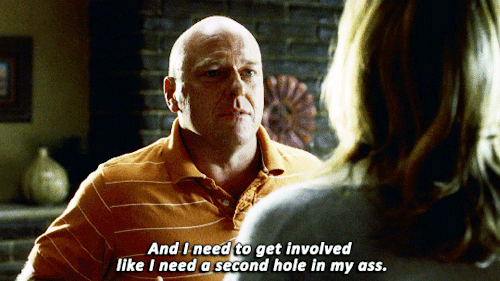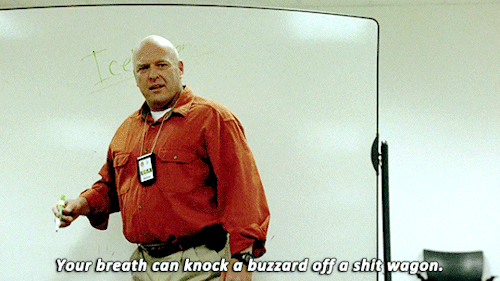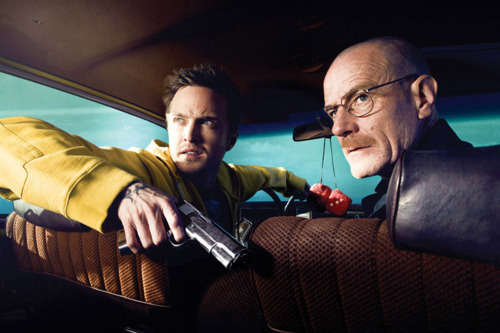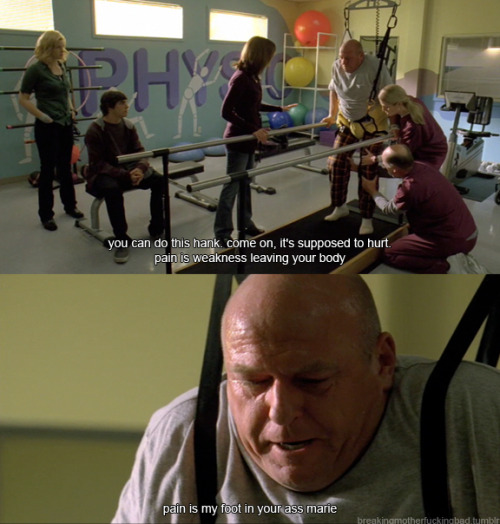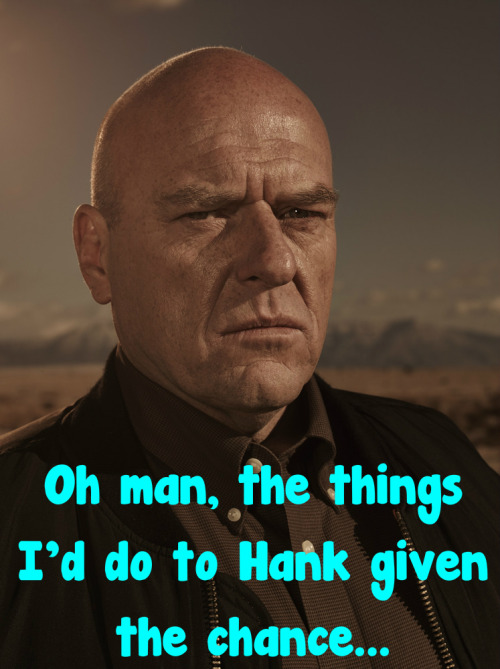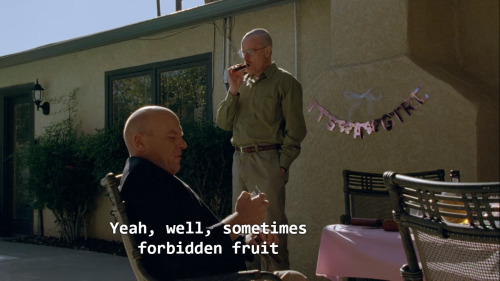#hank schrader

My poster for @bettercallsaulamc 503, The Guy For This. Hank and Gomey! Meeting Saul! How could I not draw this moment? This episode was again filled with amazing scenes and I feel like this season, more than ever, has so much great stuff that figuring out what to put in these posters is really hard. Kim in particular had a powerhouse episode, but I’m not sure how many episodes Hank and Steve will be in, so I went with that direction.
As the finale of Breaking Bad draws closer (albeit excruciatingly slowly), I’ve been reflecting more and more on what legacy the show will leave behind. I truly do think that this will be remembered as one of the shows that completely revolutionized television as a forum for storytelling, and that Vince Gilligan will always be remembered as the genius behind Heisenberg and his universe. However, I think that, lurking beneath the show’s surface, there’s a little-questioned yet troubling implication: Breaking Bad is inherently, and inescapably, a white supremacist fantasy.
I say this with no intent to diminish the magnitude of what Breaking Bad has accomplished, both as art and entertainment, but because I think that while there has been some incredible gender analysis done on the show, very little critical race theory has been taken into account in writing on the show.
Primarily, Breaking Bad is rooted in the trope of the “Mighty Whitey”, a commonly used trope in which a white protagonist infiltrates a non-white community or organization and exceeds above and beyond the actions and abilities of the people of color/native people who reside there (think The Last Samurai, Avatar (film), Daenerys Targaryen on Game of Thrones, and pretty much any movie where a white teacher goes to an inner city school and teaches kids to respect Shakespeare).
Walter White enters the alien world of methamphetamine which, at least in Gilligan’s representation of Albuquerque, is primarily controlled by the Mexican cartel. Walt thrives here, not just because he makes meth, but because he makes the best meth, clearly distinguished by its coveted blue color. His “superior” education (the product of white and class privilege) means he quickly surpasses the seasoned cartel cooks and throws the meth industry into chaos. The implication is that he can use his whiteness and the accompanying education and class privileges that come with it to produce a superior product and destroy the men of color who compose the cartel.
The violent elimination of all the people of color on the show is also deeply connected to Gilligan’s reliance on the trope of “Mighty Whitey”. While Breaking Bad was never a very diverse show, by last week’s episode, “To'hajiilee”, the show was entirely white (with the exception of Gomez, who by all appearances will be dead within three minutes on the next episode). That episode, and this season at large, was punctuated by violent displays of dominant masculinity by Todd and his neo-Nazi uncles, all of whom are decorated with swastikas and white power symbology. Incidentally, this great piece from The New Inquiry suggests that Breaking Bad functions on an unrealistic drug purity myth, which falsely claims that cleanliness and purity are rewarded in the meth world, when in fact the only purpose of these values on the show is to demonstrate Walter’s “higher” standards and capabilities.
While the show holds Walt accountable for his actions, many fans still see him as an antihero and often applaud his antagonism. One example is his stand-off with the Salamanca Cousins, who seek to avenge their family, a desire that is portrayed as a weakness by the show - it ultimately brings about their death and triggers the structural collapse of the cartel. Walt is portrayed as more rational and in control of his emotions, and his primary motivation is also rooted in family and duty. Or at least the show wants us to believe these are Walt’s primary motivations - I’ve always seen Walt as a violent, selfish man who just needed the promise of a consequence-free future, which his cancer diagnosis provided, to unleash his inner megalomaniac. However, his actions are sanitized and masculinized. The viewer is asked to believe that Walt is motivated by familial honor and love, and it seems like there is a baseline assumption that he will be granted that respect both by viewers and inhabitants of his universe because of his white skin.
Walter’s very last name - White - is, I think, the key to delineating who is allowed access to strength and power in this universe. Whiteness cloaks Walt’s actions in innocence and legitimacy, allowing viewers to privilege his emotional experiences as valid, while rooting for the destruction of the Salamanca Cousins, and later Gus Fring. He is the ultimate performance of white male power.
The relationship between Jesse Pinkman and Walt has been much examined, most notably in the context of the emotional abuse Jesse suffers at the hand of “Mr. White”. However, I think it’s worth also considering the importance of naming in Jesse as well - like Walt, his last name is rooted in color, and pink is usually connotative of femininity/childhood. When viewers first enter the Breaking Bad universe, Jesse is existing somewhat outside the traditional constructs of the white, upper middle class male privilege he was born into - he is a drop-out junkie, a low-level meth cook who dresses and speaks in “street” style, a stupid kid who can’t even remember how to keep himself alive - essentially, Jesse is an infantilized and degraded version of what Walt, and Breaking Bad, thinks a white man “should be”. Over the course of the show, as he is dragged deeper and deeper under Walt’s sway, Jesse slowly but steadily begins to re-conform to the vision of white masculinity purported by Walter, aka Mr. White, a name which so strongly begs us to see Walt as the pinnacle of white manhood it’s almost comical. From Jesse’s increased knowledge of chemistry and high level of disposable income, to his shaved head and dramatically different costume styling, the Jesse of Season 5 is worlds away from the Jesse we met in Season 1 - Walter’s influence has groomed him to perform toxic white masculinity.
We increasingly see Jesse performing aspects of Walt’s personality, aspects that coincide with Walt’s positionality as the “Mighty Whitey” of the Albuquerque meth world. In “Salud”, Season 4 Episode 10, Jesse is taken to Mexico to teach the cartel to cook blue meth, and acts out a Walter White-esque assertion of white masculinity. Jesse clearly has no idea what he’s doing, and is surrounded by far more educated and competent men, namely Benicio Fuentes, the cartel’s main cook. When informed that Fuentes’ lab synthesizes their own phenylacetic acid, Jesse is frozen, and confides to Gus that he can only recognize the acid because it comes in “the barrel with the bee on it”. Gus conveys this in Spanish to Fuentes, who is disgusted, claiming that any sophomore chemistry student can synthesize their own phenylacetic acid. Despite his lack of language skills, Jesse understands he is under attack and lashes out, telling Fuentes they’re going to do things “his way - the right way”. He may as well be saying the white way, and, as he learned from Mr. White, bullying and infantilizing people of color apparently goes a long way in the meth industry. The bilingual, university-educated Fuentes is forced to turn is lab over to a petulant child whose only credentials are the color of his skin and the audience’s willingness to believe in Jesse and Walt’s dominance.
Jesse is molded by Walt to perform alongside him as the “Mighty Whitey”, a performance rooted in the white man’s belief that all spaces can and should be under his domain. I still vacillate as to what degree I think Gilligan is aware of the implications of this trope - his naming of Walter seems hyper-conscious, but the show is still inherently conservative (see, for example, the fact that Hank is often perceived to be the moral compass/most likable character on the show - Hank is racist, sexist, verbally and emotionally abusive to Marie, and quick to engage in police brutality - which has it’s own loaded connotations in American history in relation to white supremacy). This doesn’t undermine the magnitude of what Vince Gilligan has accomplished with Breaking Bad, nor is it in any way meant to imply that he himself is a white supremacist. However, I think it’s essential to understand that for all the show has done, it is at its core a deeply white, conservative male vision of the world.


